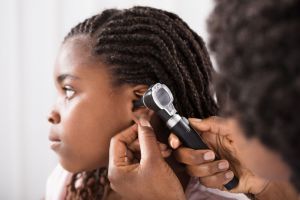|
www.HealthyHearing.com |
What to do if you suspect your school-age child has hearing loss
Contributed by Joy Victory, managing editor, Healthy Hearing, and Mandy Mroz, AuD, Former President, Healthy Hearing Key points:
Perhaps your child has recently failed a school hearing screening, or their teacher has raised some concerns about their hearing. Or maybe they seem to have difficulty understanding directions and you've always wondered: Does my child have hearing loss? 
If any of these scenarios sound familiar, don't wait to act. Schedule a hearing test for your child. Signs of hearing loss in school-aged childrenTeachers should be on the lookout for certain signs that may indicate pediatric hearing loss, including a child that:
If a teacher suggests your child might have a hearing problem, your first thought might be, “There’s no way—he hears me perfectly at home! If I say ‘dessert’ from three rooms away, he comes running!” But it’s important to understand that hearing at home and hearing in a noisy classroom are very different. Just because your child hears well at home, where it’s quiet and familiar, doesn’t mean they won’t have trouble hearing in a noisy classroom with different acoustics Ask your child these questionsNo matter what the source of the concern, it is important to have a conversation with your child about hearing loss. The following questions are a good place to start:
How hearing loss can affect childhood developmentHearing loss has an enormous impact on childhood language development, and untreated hearing loss can also add to behavioral problems. In fact, hearing loss in kids can mimic learning disorders and ADD, and is easily misdiagnosed. The longer it goes undiagnosed, the more it will impact their ability to learn. The good news? Hearing aids boost school performance and close the achievement gap. Where to get helpWhen you're ready to take the next step, find an audiologist in your area who specializes in pediatric hearing. If you're not sure whether the audiologist works with school-age children, confirm when you call to make an appointment for a full hearing examination. Remember your child may be nervous or apprehensive, so try to answer any questions he or she might have before the appointment. Let them know the test is easy and painless, and will simply involve putting on a pair of headphones like they might use to listen to a tablet or when playing a computer game. Talk to them about paying attention and following the audiologist’s instructions closely. If your child hasn't worn headphones before, you might have them try on a pair before the appointment so they know what to expect. What to expect at the hearing testJust like an adult hearing test, kids will experience pure-tone air conduction and bone conduction hearing tests, as well as speech audiometry tests. During the testing, your child will sit in a sound booth and wear headphones or a bone oscillator. He or she will be asked to respond to sounds by raising a finger, pressing a button, or repeating words. The air- and bone-conduction tests determine the child's pure tone thresholds, or the faintest tones the child can hear across a range of frequencies. The speech audiometry testing determines the speech recognition threshold, or the faintest speech the child can hear, as well as their word recognition score. The word recognition score is simply then the number of words heard correctly at a volume that is within their range of hearing. The hearing exam will also include some pain-free tests of the middle ear, called tympanometry. To do this test, the audiologist will put another earphone into the child's ear to measure acoustic reflexes, and how well the eardrum moves. Your child will only need to sit still for about five minutes to complete these tests. Some children enjoy watching the screen of the device to see if their ears can draw a mountain. The full exam will help the audiologist understand your child's hearing ability, as well as describe the type and degree of any hearing loss that is present. It may be that their hearing loss is permanent or it may be a temporary issue due to an ear infection or other middle ear condition. Is it auditory processing disorder?If your child passes their hearing exam, but you or your child still feel like they have trouble hearing—or maybe even understanding spoken words—it could be something known as auditory processing disorder. Treatments for pediatric hearing lossYour audiologist will counsel you on the results of the testing, and recommend a course of treatment that will meet your child's specific needs. Treatment may include hearing aids designed especially for children, assistive devices for the classroom (such as remote mics and FM systems), as well as referrals to other professionals like ENTs, speech-language pathologists, or other medical professionals. In some cases, a cochlear implant or bone-anchored hearing system might be recommended. Untreated hearing loss in children can affect everything from social interactions to emotional development to learning. If you (or anyone else who spends a lot of time with your child) suspect a hearing loss, be sure to get it checked out right away by an audiologist who specializes in testing for pediatric hearing loss. Joy Victory, managing editor, Healthy Hearing
Mandy Mroz, AuD, Former President, Healthy Hearing
|
Featured clinics near me
Earzlink Hearing Care - Reynoldsburg
7668 Slate Ridge Blvd
Reynoldsburg, OH 43068

Find a clinic
We have more hearing clinic reviews than any other site!


 Joy Victory has extensive experience editing consumer health information. Her training in particular has focused on how to best communicate evidence-based medical guidelines and clinical trial results to the public. She strives to make health content accurate, accessible and engaging to the public.
Joy Victory has extensive experience editing consumer health information. Her training in particular has focused on how to best communicate evidence-based medical guidelines and clinical trial results to the public. She strives to make health content accurate, accessible and engaging to the public.
 Dr. Mandy Mroz earned her doctorate in audiology from the University of Florida. Mandy’s career is guided by her dedication to serving people with hearing loss and her past experience in hearing research, training and management.
Dr. Mandy Mroz earned her doctorate in audiology from the University of Florida. Mandy’s career is guided by her dedication to serving people with hearing loss and her past experience in hearing research, training and management.